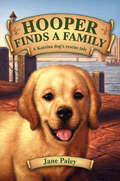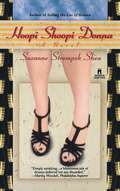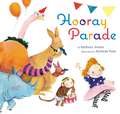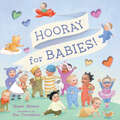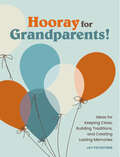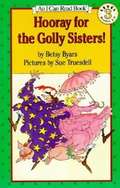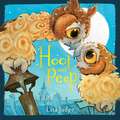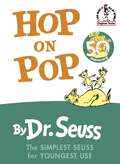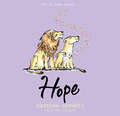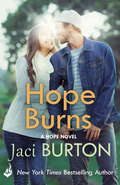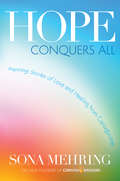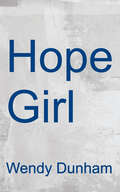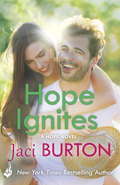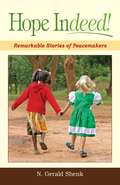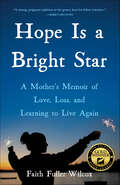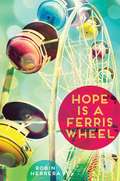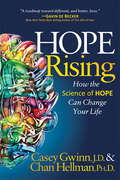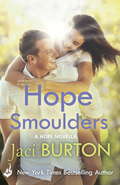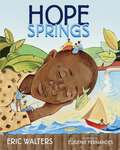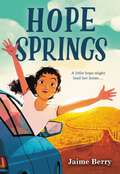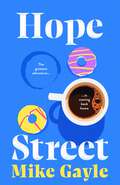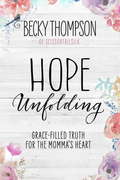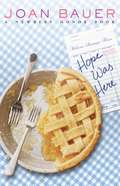- Table View
- List View
Hooper Finds a Family
by Jane PaleyHe's endearing.He's funny.He's a survivor.Here comes Hooper, one plucky, spunky dog whose warm spirit and goofy personality are irresistible. Hooper tells his own dramatic rescue tale after being left homeless in the wake of Hurricane Katrina and taking a daring trip from New Orleans to New York to meet his new family. He tells of the terrifying force of Katrina, his trials in the shelter, and being the new dog on the block in a city far from home. As Hooper struggles to find his place, he learns to overcome his fear of water and faces down feisty squirrels as well as the resident bully and top dog in his new neighborhood. In a moving tale of adventure and triumph based on a true story, meet this tenacious puppy who makes an incredible journey in search of home.
Hoopi Shoopi Donna
by Suzanne Strempek SheaGrowing up in a small New England town, 14 year-old Donna Milewski had all she needed: a grandmother, Babci, whose fragrant cooking filled their home...her mother, Helen, who lovingly stitched outfits...and Adam, the most wonderful father a daughter could imagine, who dreamed she could one day lead an all-girl polka band.Then came Betty, a tiny and adorable five-year-old, sent from Poland by Adam's destitute brother. Bringing with her only a rubber doll's leg and her old-world charm, Betty became the little sister Donna never had -- and a threat to her father's love. During a long and painful rift, a dance of betrayal and hurt, Donna must look to her beloved polka music for the key to healing.
Hooray Parade
by Barbara JoosseHooray!Someone's coming to play with you.Can you guess who?In this wonderful read-aloudfor very young children,Gramma comes to visitand brings a surprise . . . or two. . . or three.And a lot of the fun is guessingwhich surprise is next!Part thoughtful play,part playful imagination,this tongue tickling taleof funny animals and loving familywill entertain and involve childrenwith each turn of the page!
Hooray for Babies!
by Susan MeyersFrom the author of the bestselling Everywhere Babies comes a sweet and bouncy rhyming picture book that celebrates all the joys and wonders of being a baby.
Hooray for Grandparents: Ideas for Keeping Close, Building Traditions, and Creating Lasting Memories
by Jay PayleitnerA celebration of the importance of grandparents. Packed with 50 ways to be a fun, meaningful, and beloved presence in grandchildren's lives. Hooray for Grandparents celebrates the special role grandparents play in children's lives and collects 50 ways to build a strong relationship between grandparent and grandchild. It's filled with fun activities to do together, ways to create your own special traditions, advice on how to support your grandchild in difficult times, and ideas for building a legacy that lives beyond your years. Packaged in a fun and engaging format, with simple, fun, and heartwarming ways to deepen connections across generations, this is full of useful and meaningful ways for grandparents to bond with grandchildren. BREEZY BOOK FOR GRANDPARENTS: This book captures the celebratory and grandchild-focused aspects of the special relationship in a format that works for grandparents who looking for something simple but meaningful. GREAT GIFT: There are countless gifting moments for grandparents throughout the year and this book is the perfect gift for all of them, whether it's for new grandparents-to-be or grandparents who have been enjoying their status for years. With plenty of ideas for enjoying a strong relationship for the long haul, it's a wonderful way to celebrate a special grandparent any time of year. Perfect for:Grandparents; grandmothers; and grandfathersFriends and family of grandparents and grandparents-to-beNew parents looking to share the news or celebrate with grandparents-to-be
Hooray for the Golly Sisters (I Can Read Book)
by Betsy ByarsIn continued adventures, May-May and Rose take their traveling road show to more audiences.
Hoot and Peep (Hoot and Peep)
by Lita JudgeIn the night skies above Paris, an adorable young owl teaches her older brother about the power of imagination—and the unconditional love between siblings Hoot the owl is very excited for his little sister, Peep, to join him on the cathedral rooftops. She's finally old enough to learn all his big brother owly wisdom: First, owls say hooo. Second, they always say hooo. Lastly, they ONLY say hooo! But why would Peep say hooo when she could say schweeepty peep or dingity dong? Why would she speak when she could sing? As she explores the breathtaking Parisian cityscape, Peep discovers so many inspiring sights and sounds—the ring of cathedral bells, the slap of waves on stone—that she can&’t help but be swept up in the magic of it all. Hoot doesn&’t understand Peep&’s awe, until he takes a pause to listen . . . and realizes that you're never too old to learn a little something new.From the beloved author/illustrator of the classic picture book Red Sled, this gorgeous read aloud celebrates the wonder found in little things—and in the hearts of dreamers, young and old.
Hop Up! Wriggle Over!
by Elizabeth Honey“Hop up! Wriggle over! Wakey-wakey: hungry!” Thus starts a full and busy day for an appealing animal family. Simple onomatopoeic words and irresistible illustrations capture familiar routines in a young read-aloud containing a warm and subtle reminder that families come in all shapes and sizes.
Hop on Pop (Beginner Books(R))
by Dr. SeussJoin Dr. Seuss in this classic rhyming picture book–"the simplest Seuss for youngest use." Full of short, simple words and silly rhymes, this book is perfect for reading alone or reading aloud with Dad! The rollicking rythym will keep kids entertained on every page, and it's an especially good way to show Pop some love on Father&’s Day! HOP POP We like to Hop. We like to hop on top of Pop. Originally created by Dr. Seuss himself, Beginner Books are fun, funny, and easy to read. These unjacketed hardcover early readers encourage children to read all on their own, using simple words and illustrations. Smaller than the classic large format Seuss picture books like The Lorax and Oh, The Places You&’ll Go!, these portable packages are perfect for practicing readers ages 3-7, and lucky parents too!
Hope (Wish Series #3)
by Matthew CordellAs a family grows, so does its capacity for love, for dreams, and for hope. Two lions celebrate their grandchild and express all the ways this new life has expanded their world, and the hope they hold for his future.A companion to Matthew Cordell's stunning Wish and Dream, this picturebook picks up with a new animal family celebrating their little one.
Hope Burns: Hope Book 3 (Hope #3)
by Jaci BurtonHope Burns is the third in the sexy, heartwarming Hope series from Jaci Burton, New York Times bestselling author of the Play-By-Play series. Perfect for fans of Bella Andre, Jill Shalvis and Nora Roberts.Welcome to Hope, Oklahoma. The small town that's sure to warm your heart. Full of big hearts, fiery passion and love everlasting...Will she risk her heart for a second chance at love? Molly Burnett is dreading returning to her hometown of Hope for her sister's wedding, especially knowing she'll have to endure a weekend with the one man she never wants to see again - her high-school sweetheart Carter Richards. Because despite the bitter memories, she still can't forget what they once meant to each other. But when Molly is forced to extend her stay, Carter sees this as his second chance to start over again with the only woman he's ever loved. This time, he isn't going to let Molly run. Together they're going to confront the past and put it behind them, and hope for a future as bright as the flame that still burns hot between them.For more romance to warm your heart, check out the rest of the Hope series which began withHope Smoulders, or look for Jaci's sexy sports romance series, Play-By-Play, beginning with The Perfect Play.
Hope Conquers All: Inspiring Stories of Love and Healing from CaringBridge
by Sona MehringIn 1997, Sona Mehring created the first CaringBridge website when a close friend endured a life-threatening pregnancy. CaringBridge is now used by over 500,000 people a day, with 44 million unique visitors over the past year. Through CaringBridge, Mehring has witnessed thousands of stories of hope and connection among people struggling with stroke, cancer, and other life-changing conditions. HOPE CONQUERS ALL shares some of its most touching stories.HOPE CONQUERS ALL will contain stories from people of all ages and backgrounds. The adversities they face vary greatly, from children with cancer, to adults requiring life-saving transplants, to victims of horrific accidents, but their stories are unified-hope does conquer all. And CaringBridge is a place where hope grows. It's a site that helps people reach out and stay in touch through moments of great need. It inspires them and instills hope; it helps foster and encourage much-needed emotional connection. These intimate personal stories, which reveal the underlying spiritual presence that connects us all, will encourage people to create channels of love and support in their own lives.
Hope Girl
by Wendy DunhamWith the discovery of her birth father, 12-year-old River has definite thoughts about how her life should turn out--and that certainly does not include any of the challenges that keep popping up! It's not easy to decide if she should live with Gram, who has been her family for the past ten years, or with her father, who she's over-the-moon to have just met but knows little about. When River gets diagnosed with scoliosis, she fears it will impact her hopes and dreams. River decides to ask God for help. When River makes a new friend, Carlos, she realizes that having scoliosis isn't so bad when she learns what Carlos deals with every day. As this tender-sweet story unfolds, River learns to persevere and stay hopeful that soon she will be part of a real family. Yes, her dream does come true...but not in the way she had planned!
Hope Ignites: Hope Book 2 (Hope #2)
by Jaci BurtonHope Ignites is the second in the sexy, heartwarming Hope series from Jaci Burton, New York Times bestselling author of the Play-By-Play series. Perfect for fans of Bella Andre, Jill Shalvis and Nora Roberts.Welcome to Hope, Oklahoma. The small town that's sure to warm your heart. Full of big hearts, fiery passion and love everlasting...She is one distraction he simply can't resist... When a move crew asks to film on his cattle ranch, Logan McCormack doesn't expect Desiree Jenkins, the young star with the bad-girl rep, to be so open, so down-to-earth...or so intimately interested in him.Des is desperate for an escape from paparazzi and gossip columns, and she's found it at Logan's ranch. But more than that, she hoping that this real-life cowboy will be the one to accept her for who she is, and give her the kind of happily ever after that can't be found in the movies...For more romance to warm your heart, check out the rest of the Hope series which began with Hope Smoulders, or look for Jaci's sexy sports romance series, Play-By-Play, beginning with The Perfect Play.
Hope Indeed: Remarkable Stories Of Peacemakers
by N. ShenkGerald Shenk has traveled to and lived in many difficult places. He goes to teach-and to spot people who act out of hope. When he began to feel fortified by what he discovered, even foolishly rich, he wrote what he had witnessed and heard for the rest of us. Hope Indeed! is his collection of stories of stunningly ordinary people behaving with extraordinary hope. Here are the stories of- Ned Wyse, a farmer/pastor in Michigan, chosen randomly for a violent beating by some neighborhood kids, and what he did about it. The Palestinian parents who gave their young murdered son's organs to ill Jewish children. The Amish, who subverted the vicious violation of their innocent children in the Nickel Mines school by refusing to multiply the horror, and instead offered forgiveness and generosity. Jewish Cantor Michael Weisser and his family who took carry-out food to the white supremacists who had harassed them mercilessly. The German Lutheran pastor couple who offered their home to recently desposed and homeless Erich Honecker, who had ruthlessly ruled East Germany. Brother Ivo who kept bringing former Catholic and Muslim neighbors together as war escalated in Bosnia. Says Shenk, "Here are stories to rehearse if we want to become people who subvert vengeance with kindness."
Hope Is a Bright Star: A Mother's Memoir of Love, Loss, and Learning to Live Again
by Faith Fuller WilcoxHope Is a Bright Star is the story of a mother’s journey from shock and fear at her young daughter’s cancer diagnosis to anguish and despair at her death just a year later—and, finally, to peace and acceptance of her new life.When thirteen-year-old Elizabeth is diagnosed with a rare bone cancer, Faith is in awe of her courageous child, who faces her plight straight on and inspires all who meet her. Despite an army of medical professionals who provide innovative care for Elizabeth, she dies, and Faith and her surviving daughter, Olivia, are thrown into a maelstrom of grief. They find unexpected comfort in the arms of their family, friends, and community—but Faith faces another shock when she has her own cancer diagnosis while navigating the uncharted waters of a life she never expected. In time, Faith discovers moments and places of comfort and peace, and she slowly changes from a mother in despair to a woman with hope for the future. At turns heartbreaking and heartwarming, Hope Is a Bright Star reveals how abiding love can heal a family.
Hope Is a Ferris Wheel
by Robin HerreraAfter moving from Oregon to a trailer park in California, ten-year-old Star participates in a poetry club, where she learns some important lessons about herself and her own hopes and dreams for the future. STAR MACKIE lives in a trailer park with her flaky mom and her melancholy older sister. Moving to a new town has made it difficult for Star to make friends. Her classmates tease her because of where she lives and because of her layered blue hair. But when Star starts a club at school, she comes to terms with her own hopes for the future--with a little help from Emily Dickinson. With an unforgettable voice and a lot of heart, Hope Is a Ferris Wheel is the story of a girl who learns to accept her family and herself while trying to make sense of the world around her.
Hope Rising: How the Science of HOPE Can Change Your Life
by Casey Gwinn Chan HellmanHope Rising is a clarion call to apply the science of hope in daily life and overcome the trauma, adversity, and struggles everyone must face. Hope is the most predictive indicator of well-being in a person&’s life in all the research done on trauma, illness, and resiliency. Based on nearly 2,000 published studies about hope, including their own research, Casey Gwinn and Chan Hellman call for rising hope to be the focus not only in personal lives, but in public policy in education, business, social services, and every other part of society. Hope is measurable. Hope is malleable. Hope changes lives. Hope Rising provides a roadmap to measure hope in your life, assess what may have robbed you of the power of hope, and then provides strategies to increase hope. It challenges every reader to be transparent and honest about their own stories of struggle and adversity, calls for the end of shame and blame in addressing the struggles of those who have experienced trauma, illness, or abuse, and provides practical ways to increase your Hope score and thrive because of it.
Hope Smoulders: A Hope Novella 0.5 (Hope #2)
by Jaci BurtonHope Smoulders is the novella introducing the sexy, heartwarming Hope series from Jaci Burton, New York Times bestselling author of the Play-By-Play series. Perfect for fans of Bella Andre, Jill Shalvis and Nora Roberts.Welcome to Hope, Oklahoma. The small town that's sure to warm your heart. Full of big hearts, fiery passion and love everlasting...Jane Kline is a struggling divorcee and single mother with a social life on hold. Not only does Jane not have the time to date anyone, she's not even going to consider making herself vulnerable to another man after being deserted by her husband. That's why Will Griffin, her ex's former best friend, takes her totally by surprise. What would such a hot and sexy wild card see in a harried mother juggling two kids and two jobs? For starters, everything Jane no longer sees in herself. As she dares to take the flirtation to the next step, Jane finds herself back where she never wanted to be - falling for another man. Now it's up to Will to convince Jane that she has everything he wants in a woman, and that the second time around can be the best time of all.For more romance to warm your heart, check out the rest of the Hope series continuing with Hope Flames, or look for Jaci's sexy sports romance series, Play-By-Play, beginning with The Perfect Play.***Hope Smoulders previously appeared in the anthology Hot Summer Nights***
Hope Springs
by Eric WaltersA drought has settled in the area around the orphanage where Boniface lives. There are long line-ups at the tiny spring where all the local people get their water, and suddenly the orphans are pushed to the back of the line, unwelcome. Boniface's houseparent, Henry, tells him that the people were mean out of fear--they feared there would not be enough water for their families. When the building of the orphanage's well is completed, Boniface has an idea to help the villagers. A lovely story of kindness and heart, this story shows that, through compassion and understanding, true generosity can spring from unexpected places.
Hope Springs
by Jaime BerryFans of Kate DiCamillo and Katherine Applegate will fall in love with this tug-at-your-heartstrings middle grade novel about one girl who is desperate to find the "perfect home" as she moves from one town to the next with her Grandmother.Eleven-year-old Jubilee Johnson is an expert at three things: crafting, moving, and avoiding goodbyes. On the search for the "perfect place," she and her Nan live by their Number One Relocation Rule -- just the two of them is all they need. But Jubilee's starting to feel like just two is a little too close to alone.Desperate to settle down, Jubilee plans their next move, Hope Springs, Texas -- home of her TV crafting idol, Arletta Paisley. Here she meets a girl set on winning the local fishing tournament and a boy who says exactly the right thing by hardly speaking at all. Soon, Jubilee wonders if Hope Springs might just be the place to call home.But when the town is threatened by a mega-chain superstore fronted by Arletta Paisley, Jubilee is faced with skipping town yet again or standing up to her biggest bully yet. With the help of her new friends and the one person she never thought she'd need -- her Momma -- will Jubilee find a way to save the town she's come to love and convince Nan that it's finally time to settle down?
Hope Street: poignant, warm and unforgettable; where the greatest adventure is coming back home
by Mike GayleThe greatest adventure is coming back home. Lila Metcalfe is a trainee journalist in Derby and she's very used to being given the stories that no one else wants. So, when her editor tells her that the city's Cossington Park development is being held up by a solitary resident on Hope Street who is refusing to leave, she knows she is going to be the one sent to find out more. And that's how she meets Connor.Twenty-something Connor is the sole resident of Hope Street and he is not at all what Lila is expecting. And he has a very clear reason not to move: he is waiting for his mum to come home. The uplifting and heartfelt new novel from the author of A Song of Me and You.
Hope Street: poignant, warm and unforgettable; where the greatest adventure is coming back home
by Mike GayleThe greatest adventure is coming back home. Lila Metcalfe is a trainee journalist in Derby and she's very used to being given the stories that no one else wants. So, when her editor tells her that the city's Cossington Park development is being held up by a solitary resident on Hope Street who is refusing to leave, she knows she is going to be the one sent to find out more. And that's how she meets Connor.Twenty-something Connor is the sole resident of Hope Street and he is not at all what Lila is expecting. And he has a very clear reason not to move: he is waiting for his mum to come home. The uplifting and heartfelt new novel from the author of A Song of Me and You.
Hope Unfolding: Grace-Filled Truth for the Momma's Heart
by Becky ThompsonGod's love, plans, and promises for you are forever unfolding. I get it, Momma. I totally get it. Every day you wake up and try your very best. You love, give, and pour out your life for the ones who call you Momma. But no matter how much you offer, there are still days you feel as though you come up short. You worry, Am I loving these babies enough? Is this ever going to get easier? Why does it seem like I am the only one who cannot balance it all? Sometimes, we just need hope (and maybe a long uninterrupted nap). We need someone to help tune our hearts to the voice of the Father and to remind us that He has not forgotten about us. In Hope Unfolding, Becky Thompson is a friend who reminds you that you aren't alone, and that God is still writing your story. She guides you to encounter the Truth of God's presence that not only fuels you with strength, but also a fresh confidence. And beyond gaining faith that tomorrow could be different, you find hope and purpose where you are standing today.
Hope Was Here
by Joan BauerWhen Hope and her aunt move to small-town Wisconsin to take over the local diner, Hope's not sure what to expect. But what they find is that the owner, G.T., isn't quite ready to give up yet--in fact, he's decided to run for mayor against a corrupt candidate. And as Hope starts to make her place at the diner, she also finds herself caught up in G.T.'s campaign--particularly his visions for the future. After all, as G.T. points out, everyone can use a little hope to help get through the tough times... even Hope herself. <P><P> Newbery Medal Honor book<P> Winner of Pacific Northwest Library Association’s Young Reader’s Choice Senior Award
